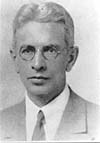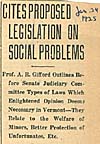

 ASA RUSSELL GIFFORD (1881-1964)
ASA RUSSELL GIFFORD (1881-1964)Professor of Philosophy, University of Vermont
"From a study of ethics I was led into the field of social ethics. This probably first took concrete form when I served as secretary of a survey of housing and charities made here in Burlington. The survey led into problems of family welfare and case work, and we began to see the need for doing something concretely for children in an intelligent way." |
A. R. Gifford, The Vermont Alumnus, Jan 10, 1941 |
 Asa Gifford came to the University of Vermont in 1909 as a professor of intellectual
and moral philosophy. Born in Massachusetts, he received his A.B. from Wesleyan
College in 1904 and a Master's degree from Yale in 1907. He taught
philosophy at Bryn Mawr College for two years before coming to Vermont. At
UVM Professor Gifford taught social ethics, philosophy, and social psychology
and chaired the Philosophy Department until his retirement in 1946. Throughout
his career, Gifford was actively involved in social reform. As a founder
and officer of the Vermont Conference of Social Work and Chairman of the
Committee on Social Legislation for the Vermont Conference of Social Work,
Gifford led the crusade for progressive reforms in social welfare policy in
the state legislature.
Asa Gifford came to the University of Vermont in 1909 as a professor of intellectual
and moral philosophy. Born in Massachusetts, he received his A.B. from Wesleyan
College in 1904 and a Master's degree from Yale in 1907. He taught
philosophy at Bryn Mawr College for two years before coming to Vermont. At
UVM Professor Gifford taught social ethics, philosophy, and social psychology
and chaired the Philosophy Department until his retirement in 1946. Throughout
his career, Gifford was actively involved in social reform. As a founder
and officer of the Vermont Conference of Social Work and Chairman of the
Committee on Social Legislation for the Vermont Conference of Social Work,
Gifford led the crusade for progressive reforms in social welfare policy in
the state legislature.
Gifford was most remembered for his efforts on behalf of children. A founder of the Vermont Children's Aid Society and President from 1919 to1946, Gifford promoted modern standards of child care through lobbying for adoption of a "Children's Code" and state-funded mental testing programs, psychiatric clinics, and professional child and family "case work." Gifford's early writings demonstrate the shared beliefs of child welfare advocates and eugenicists in the 1920s (see Roots section). Gifford served on the Advisory Committee of the Eugenics Survey of Vermont and the Committee on the Human Factor of the Vermont Commission on Country Life.